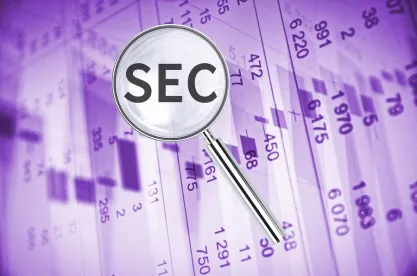SEC Chairman Jay Clayton has repeatedly touted his focus on “Main Street.” In doing so, he unleashed the Division of Enforcement’s Asset Management specialty unit on the investment advisory industry and finalized and implemented the “Reg BI” rulemaking, the SEC’s most significant sales practice regulatory development for the brokerage industry in decades. But the Division of Enforcement did not slow down its efforts in one of its core focus areas: the investigation and civil prosecution of accounting fraud by public companies and their senior officers.
On July 31, 2020, the SEC announced that Bausch Health, formerly Valeant Pharmaceuticals (“Valeant” or the “Company”), agreed to pay a $45 million penalty to settle charges of accounting misstatements. Three former executives – the chief executive officer, chief financial officer, and controller – also agreed to pay penalties to settle charges against them. The SEC credited the Company with cooperating, replacing executives, revising policies and accounting controls, and training employees in accounting, according to the settlement.
The specific charges involved improper revenue recognition and misleading disclosures in SEC filings and earnings presentations. According to the SEC’s orders, when announcing certain financial measures, the Company, among other things, misstated revenue transactions and included erroneous revenue allocations. Much of that growth came from sales to another company that acted as a mail order pharmacy that Valeant helped establish, fund and subsidize. The orders find that the Company improperly recognized revenue relating to this other company, and Valeant did not disclose its unique relationship with or the risks related to this other company in SEC filings and earnings and investor presentations. The SEC order also found that the Company failed to disclose the material impact of certain revenue it received from drug wholesalers following a 500% increase in the price of a single drug that the Company acquired in April 2015. The Company erroneously attributed the resulting revenue to more than 100 unrelated products and did not record any as attributable to that drug. Additionally, in its SEC filings and earnings presentations for the second and third quarters of 2015 and its 2015 year-end report, Valeant failed to disclose the impact of that allocation on its GAAP and non-GAAP financial measures. These settlements relate to a parallel criminal case in which a former company executive was convicted in a kickback scheme with the owner of the other company that was established, funded, and subsidized by Valeant.
The Co-Director of the SEC Enforcement Division admonished, “Public companies and their senior executives have a duty to be truthful to investors.” He further stated that, “Complete disclosures are critical, and we must hold accountable corporate executives, who are in the best position to ensure accurate information is provided to investors.”
Despite such tough talk, the SEC charged the Company with violations of Sections 17(a)(2) and (a)(3) of the Securities Act of 1933 (“Securities Act”) and other non-scienter/non-knowing-based regulatory violations. The SEC did not charge the Company or the senior officers with the scienter-based, more serious, and more difficult to establish violations of Section 17(a)(1) of the Securities Act and Rule 10b-5 of the Securities Exchange Act of 1934 and Section 10(b) thereunder. While the lower charges are beneficial to the Company and the individuals charged, the SEC’s evolving practice over the years of charging non-scienter-based violations accompanied by scienter-based sounding press releases is a tactic that companies need to be mindful of when negotiating with the Division of Enforcement staff.




 />i
/>i

